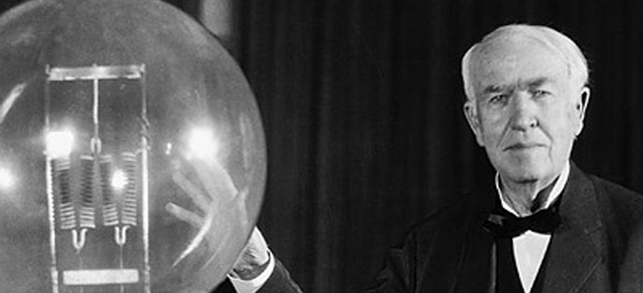Most of us can reel off past inventions. Does that mean modern day ones are less significant? Tanya Weaver ponders this and possibly the greatest invention of our time — 3D printing
If you had to ask someone to name five of the world’s greatest inventors, I bet that most would rattle off the names of inventors long gone like Thomas Edison, James Watt, Alexander Graham Bell, Benjamin Franklin and Karl Benz. This got me thinking – who are today’s great inventors? Or, because we can’t readily name any, are we less inventive?

Thomas Edison – “Inspiration can be found in a pile of junk. Sometimes, you can put it together with a good imagination and invent something” “
One possible reason why we know the names of these inventors from past centuries is because their inventions were so significant in how fundamentally they changed people’s lives.
For instance, Scotsman James Watt created the first viable steam engine in the second half of the 18th century. This piece of machinery was central to the Industrial Revolution as it spearheaded quicker means of transportation in the form of steam locomotives and steamships (an interesting fact: Watt coined the term ‘horsepower’ as a way to help explain how much work his steam engines could do for a potential buyer).
Similarly, the American Thomas Edison invented the first commercially practical incandescent light bulb in 1880. Thereafter he founded the Edison Electric Light Company (now General Electric) to oversee the layout of the first electric distribution grid in Manhattan, New York. Pretty significant compared to what was used to light up homes and businesses before.
Edison filed 1,093 patents in his life, quite a number for one person. But if the filing of patents is a measure of how quickly we are inventing, statistics suggest that today we are more inventive than ever.
The United Nation’s World Intellectual Property Organisation (WIPO), reported that intellectual property patent filings worldwide grew at their fastest pace in almost two decades in 2012, reaching an estimated 2.35 million applications filed. Whilst the European Patent Office recently reported a new all-time high of patents filed with 265 000 received last year, a 2.8 per cent increase over 2012.
Admittedly, most of these patents are filed by companies and organisations as opposed to lone inventors. So, does this suggest that the era of the great inventor is over – that somewhat romantic notion of a genius concocting and experimenting in a lab or shed before unleashing their invention on the world? Possibly, yes. Invention doesn’t happen in a vacuum and is more likely a team effort.
Even in the past, although one person was credited for an invention, they seldom worked in isolation. Edison, as an example, had set up an industrial research lab (he can even be credited for inventing R&D labs because apparently that was the first one) called Menlo Park in New Jersey where he and his team worked on several inventions together.
This surely proves that invention is a collaborative process involving many different people. And although Elon Musk and Jonathan Ive could be attributed the title of modern day inventors, their inventions are absolutely a team effort. There is no way that, considering the complexity of products today, they could invent in isolation.
But then it’s the question: are today’s inventions less significant? Some economists think they are and even argue that the rate of progress seems slow compared to that golden era of invention. But couldn’t it be the case that instead of ground-breaking inventions, today’s inventions instead offer incremental change and enhancements to existing products. So, evolution rather than revolution.
As James Bessen, a researcher and lecturer at the Boston University School of Law, states in his paper ‘Where have the Great Inventors gone?’: “Modern inventions may be more incremental as with, for example, the many minor improvements made in frequent software upgrades. Each of these improvements is less significant individually but this does not necessarily mean modern innovation is less significant when taken as a whole.”
One invention, which has been incrementally developed over the years to the point that it is now being lauded as ushering in the second industrial revolution with the potential to transform every aspect of our lives, is 3D printing.
Although it’s getting an inordinate amount of press coverage, to the point where even Joe Bloggs is taking note at the potential of having a mini factory in his living room, it’s not a new invention, unless you can call a 30 year old invention new.
But what has changed since the founder of 3D Systems Charles ‘Chuck’ Hall invented stereolithography in 1983 is that today the machines are faster, cheaper, smaller and the technology more sophisticated.
So, although originally used by manufacturers and designers to prototype and test designs, 3D printing technology has now developed to the point where it can be used by far more users. On the one end of the scale there are scientists who are using the technology to print human tissue and on the other there is the aforementioned Mr Bloggs who can now afford one of the umpteen consumer 3D printers on the market, making that living room factory viable.
So, if we are to believe the hype that ‘if you dream it, you can build it’, 3D printing in theory can make inventors out of all of us. And if we do come to print off our own products, for personal use or even to sell, where do we stand in terms of intellectual property (IP)? Is the invention ours if we designed it or are we merely printing someone else’s IP?
Interesting fodder for another comment piece but in the meantime I’ll leave you with some inspiring and thought provoking quotes from that great inventor Thomas Edison:
“Genius is one per cent inspiration and ninety nine per cent perspiration”.
“Inspiration can be found in a pile of junk. Sometimes, you can put it together with a good imagination and invent something”.
“If we all did the things we are really capable of doing, we would literally astound ourselves”.
The myth of the lone inventor
Default






